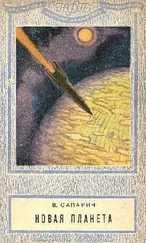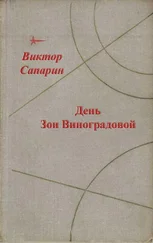Виктор Сапарин - The Trial of Tantalus
Здесь есть возможность читать онлайн «Виктор Сапарин - The Trial of Tantalus» весь текст электронной книги совершенно бесплатно (целиком полную версию без сокращений). В некоторых случаях можно слушать аудио, скачать через торрент в формате fb2 и присутствует краткое содержание. Жанр: Фантастика и фэнтези, на английском языке. Описание произведения, (предисловие) а так же отзывы посетителей доступны на портале библиотеки ЛибКат.
- Название:The Trial of Tantalus
- Автор:
- Жанр:
- Год:неизвестен
- ISBN:нет данных
- Рейтинг книги:5 / 5. Голосов: 1
-
Избранное:Добавить в избранное
- Отзывы:
-
Ваша оценка:
- 100
- 1
- 2
- 3
- 4
- 5
The Trial of Tantalus: краткое содержание, описание и аннотация
Предлагаем к чтению аннотацию, описание, краткое содержание или предисловие (зависит от того, что написал сам автор книги «The Trial of Tantalus»). Если вы не нашли необходимую информацию о книге — напишите в комментариях, мы постараемся отыскать её.
The Trial of Tantalus — читать онлайн бесплатно полную книгу (весь текст) целиком
Ниже представлен текст книги, разбитый по страницам. Система сохранения места последней прочитанной страницы, позволяет с удобством читать онлайн бесплатно книгу «The Trial of Tantalus», без необходимости каждый раз заново искать на чём Вы остановились. Поставьте закладку, и сможете в любой момент перейти на страницу, на которой закончили чтение.
Интервал:
Закладка:
One more final examination and they stepped out into the prison yard.
Svensen pointed to a low, rectangular structure.
"All the influenzas are in there. Over a hundred of them. And this is the plague block. Not very small either, is it?
"A pure anachronism," he added hastily, noticing Barch's involuntary shudder. "It is one of medicine's paradoxes that we have learned so much about the plague since we have had it here under lock and key and found such swift and effective remedies that even if it happened to escape it would only give us a little extra trouble, but that is all. If mankind had possessed these remedies before, the plague would have been no more harmful, in fact far less so, than influenza. I mean the common forms of plague, of course."
"What other kinds are there?"
"Oh, a great many varieties we never knew about liave been discovered latterly. They were not noticed formerly because their bacilli always accompanied ordinary Bubonic plague, and in minute numbers. One of the new forms discovered," Svensen continued with a note of pride in his voice, "is more deadly than anything mankind ever knew. No serum affects it."
"How thrilling," said Barch coldly. "You sound as if you would welcome the Tantalus as well!"
"And indeed why not?" said Svensen. "Remember the case of the relapsing fever pathogene?" he went on. "It was destroyed on the insistence of the doctors. And what was the result? Ten years after the last specimen was killed, a microbiologist studying the subject from books, established that this organism would have been extremely useful-in a slightly modified form, of course-for many of the processes man needs. But try and find a relapsing fever germ in the entire Universe now!"
In his eagerness Svensen gripped Barch's arm with a strength surprising in a man of his puny build. Barch saw that the famous germ gaoler was off on his favourite subject.
"Microbes, like men, are neither wholly bad nor wholly good," Svensen declared, his voice booming as if he were addressing an audience. "Men are coming to realize this, and in time their attitude to microbes will change still more. But for scientific purposes it is essential that all the microbes of Earth and the other planets should always be available to the researcher. That is why the germ gaol, or the microbe sanatorium, or whatever you choose to call it, is in my opinion a brilliant idea and we should all be eternally grateful to its author Karbyshev."
Barch listened to this tirade with interest although he caught himself thinking that the idea had indeed become an obsession with Svensen.
"We seldom have visitors here," Svensen said in a normal voice. "But I shall be glad to show you anything you wish."
'That is very kind of you."
"What exactly would you like to see?"
"The plague block," said Barch firmly.
They were admitted to the plague block without any special preliminaries. Evidently it was believed that the danger of any microbes existing under the dome was excluded.
A wide corridor led into the depths of the building. On either side were narrow doors bearing signs indicating the different varieties of plague in black letters against a yellow background.
Svensen stopped at one of these doors.
"Here we have the Pestis mortis," he said. "The one I told you about."
The door opened and Barch followed Svensen into a small ante-chamber. To his surprise they were kept there for some time before the lamp in the ceiling flashed green.
"What are you afraid of?" he asked. "Surely not bacteria from the corridor? What could we bring in that would be more deadly than what is already here?"
"We don't believe in mixing bacteria," Svensen explained. "It distorts the picture. After all, that is why it took us so long to discover the Pestis mortis..."
The laboratory was like any other laboratory-there was the usual long table with test-tubes and retorts and a row of thermostats along the walls.
"It is here," thought Barch, looking askance at the neat cupboards.
Two researchers, dressed in the same kind of overalls as those worn by Barch and Svensen but with white masks and white gloves, were working at the table.
Barch suddenly found himself wishing that he too were protected by gloves and a mask. He glanced questioningly at Svensen, but that enthusiast evidently scorned such precautions.
"Would you like to have a look?"
Svensen led him over to a microscope standing on the table. Barch bent over the eyepieces and started: a large snake was writhing and wriggling in the yellow broth- true, unlike a snake it had no head and its tail did not taper, but it looked disgustingly reptilian.
Svensen adjusted the microscope and Barch saw tf\fc fine blade of a knife approach the convulsively twitching body. The snake gave a jerk but at the same instant the knife struck and severed a piece of its body. Another swift, almost imperceptible movement and the reptile had been halved lengthwise.
The automatic dissector went on with its work. Barch felt a wave of something like nausea. This was not the first time he was seeing these monsters, invisible to the naked eye, and no one knew better than he how much havoc and destruction they could cause. He was no coward. But the sight of this magnified microbe which seemed about to leap at the dissector's knife revolted him.
As he watched the silent men in masks calmly handing one another test-tubes containing the most horrible death that had ever existed on Earth, Barch could not help admiring them and all the others who worked in these laboratories, searching for means of protecting men from disease that might prove useful in combating diseases on other planets.
"Come along," Svensen said quickly. "The temporary masks on our faces and hands will soon evaporate."
So the exposed parts of their bodies had been subjected to some sort of protective treatment while they had stood in that ante-chamber. Barch felt a little better.
"Thank goodness that's over," he thought with relief when the lamp on the ceiling of the exit chamber flashed green.
But he had rejoiced too soon. The outside door still remained tightly closed. Another minute and the floor in the ante-chamber began to descend slowly. After that the entire procedure they had undergone on entering the gaol was repeated-the spraying, the washing, the radiation- before finally the control apparatus released them.
"But what if something did happen?" Barch asked.
Svensen shrugged his shoulders.
"Oh, quarantine, of course. Injections, and all the rest of it."
"Yes, but you say no serum is effective?"
Svensen did not reply. To talk to him about the danger of infection was like talking to a soldier about the danger of stray bullets during a battle.
"Would you like to see the virus block?" he suggested.
They spent a long time in the virus block. Svensen showed Barch over all the laboratories. Although Barch had no hope of finding the Tantalus or any remote relative of the microbe here he was nevertheless much interested in what he saw. Much of what was being done here could not be observed elsewhere on Earth, for ordinary laboratories handled harmless material exclusively.
In one place he stood for a long while watching some tiny creatures resembling miniature wire springs splitting and multiplying before his eyes. The form of the springs constantly changed, making a kaleidoscopic pattern. All the transformations, the laboratory assistants told him, were induced artificially.
"We have already created about six hundred new forms," they said.
Barch took out his Universal and recorded the "springs" and the researchers' explanation.
"I am very grateful to you for this opportunity to visit your prison," said Barch as he took leave of Svensen. "I feel I have not wasted my time."
Читать дальшеИнтервал:
Закладка:
Похожие книги на «The Trial of Tantalus»
Представляем Вашему вниманию похожие книги на «The Trial of Tantalus» списком для выбора. Мы отобрали схожую по названию и смыслу литературу в надежде предоставить читателям больше вариантов отыскать новые, интересные, ещё непрочитанные произведения.
Обсуждение, отзывы о книге «The Trial of Tantalus» и просто собственные мнения читателей. Оставьте ваши комментарии, напишите, что Вы думаете о произведении, его смысле или главных героях. Укажите что конкретно понравилось, а что нет, и почему Вы так считаете.



